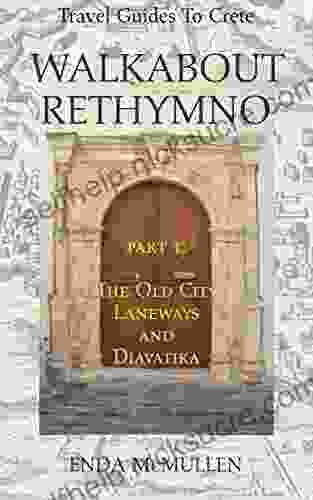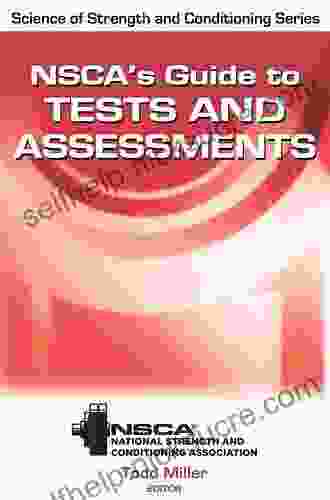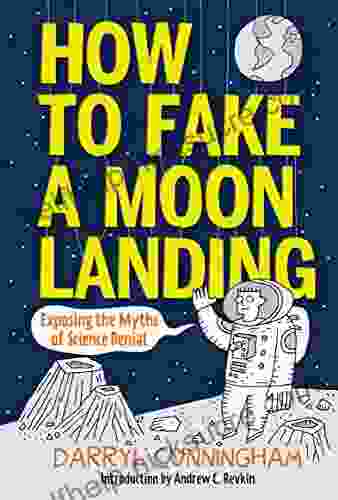The NSCA Guide to Tests and Assessments: A Vital Resource for Strength and Conditioning Professionals

As a strength and conditioning professional, it is crucial to possess a thorough understanding of how to accurately assess clients' fitness levels and tailor training programs to their individual needs. The National Strength and Conditioning Association (NSCA) offers a comprehensive suite of tests and assessments specifically designed to evaluate various aspects of physical performance.
4.6 out of 5
| Language | : | English |
| File size | : | 6890 KB |
| Text-to-Speech | : | Enabled |
| Screen Reader | : | Supported |
| Enhanced typesetting | : | Enabled |
| Word Wise | : | Enabled |
| Print length | : | 368 pages |
| Lending | : | Enabled |
Purpose of NSCA Tests and Assessments
The primary purpose of NSCA tests and assessments is to:
- Objectively measure clients' strength, power, endurance, and other fitness parameters
- Identify areas of strength and weakness
- Monitor progress over time
li>Make informed decisions about training program design
Types of NSCA Tests and Assessments
The NSCA offers a wide range of tests and assessments that can be used to evaluate different aspects of fitness. These tests and assessments can be categorized into the following groups:
- Strength assessments measure the amount of force that an individual can produce in a single maximal effort. Common strength assessments include the one-repetition maximum (1RM) test, the vertical jump test, and the bench press test.
- Power assessments measure the ability to produce force quickly and explosively. Common power assessments include the vertical jump test, the broad jump test, and the medicine ball throw.
- Endurance assessments measure the ability to sustain physical activity over an extended period of time. Common endurance assessments include the VO2 max test, the lactate threshold test, and the treadmill test.
- Flexibility assessments measure the range of motion around a joint. Common flexibility assessments include the sit-and-reach test, the shoulder flexion test, and the hamstring flexibility test.
- Body composition assessments measure the amount of fat, muscle, and bone in the body. Common body composition assessments include the skinfold test, the bioelectrical impedance analysis (BIA),and the underwater weighing test.
- Speed assessments measure the ability to move quickly from point A to point B. Common speed assessments include the 40-yard dash, the 100-meter dash, and the shuttle run.
- Agility assessments measure the ability to change direction quickly and efficiently. Common agility assessments include the agility T-test, the pro agility shuttle, and the Illinois agility test.
Benefits of Using NSCA Tests and Assessments
There are numerous benefits to using NSCA tests and assessments in your strength and conditioning practice. These benefits include:
- Improved accuracy and objectivity: NSCA tests and assessments are standardized and validated, which ensures that they provide accurate and reliable results.
- Identification of strengths and weaknesses: NSCA tests and assessments can help you identify areas where your clients need to improve. This information can be used to develop targeted training programs that address specific needs.
- Tracking progress over time: NSCA tests and assessments can be used to track your clients' progress over time. This information can be used to make adjustments to training programs as needed.
- Enhanced communication with clients: NSCA tests and assessments can help you communicate with your clients about their fitness progress. This information can motivate clients to stay on track with their training programs.
Administration of NSCA Tests and Assessments
NSCA tests and assessments should be administered by qualified professionals who have received appropriate training. The administration of these tests and assessments requires specialized equipment and knowledge of proper testing procedures. It is important to follow the NSCA's guidelines for administering tests and assessments to ensure that the results are accurate and reliable.
Interpretation of NSCA Tests and Assessments
The interpretation of NSCA tests and assessments requires a thorough understanding of the underlying principles of exercise science. It is important to consider the client's age, gender, and fitness level when interpreting the results of these tests and assessments. The NSCA provides resources to help professionals interpret the results of tests and assessments and make appropriate recommendations for training programs.
The NSCA's tests and assessments are essential tools for strength and conditioning professionals. By understanding the purpose, administration, and interpretation of these tests and assessments, you can effectively evaluate clients' fitness levels and design personalized training programs that will help them achieve their goals.
4.6 out of 5
| Language | : | English |
| File size | : | 6890 KB |
| Text-to-Speech | : | Enabled |
| Screen Reader | : | Supported |
| Enhanced typesetting | : | Enabled |
| Word Wise | : | Enabled |
| Print length | : | 368 pages |
| Lending | : | Enabled |
Do you want to contribute by writing guest posts on this blog?
Please contact us and send us a resume of previous articles that you have written.
 Fiction
Fiction Non Fiction
Non Fiction Romance
Romance Mystery
Mystery Thriller
Thriller SciFi
SciFi Fantasy
Fantasy Horror
Horror Biography
Biography Selfhelp
Selfhelp Business
Business History
History Classics
Classics Poetry
Poetry Childrens
Childrens Young Adult
Young Adult Educational
Educational Cooking
Cooking Travel
Travel Lifestyle
Lifestyle Spirituality
Spirituality Health
Health Fitness
Fitness Technology
Technology Science
Science Arts
Arts Crafts
Crafts DIY
DIY Gardening
Gardening Petcare
Petcare Mami Wata
Mami Wata Collins Dictionaries
Collins Dictionaries Leonard Susskind
Leonard Susskind Brooke Dojny
Brooke Dojny M Prefontaine
M Prefontaine Mercedes Lackey
Mercedes Lackey Kimberly Willis
Kimberly Willis Linda Fairley
Linda Fairley Deborah Hughes Hallett
Deborah Hughes Hallett Don Casey
Don Casey Dusty Phillips
Dusty Phillips Pat Mora
Pat Mora Peggy Kaye
Peggy Kaye Dima Zales
Dima Zales Colleen Hoover
Colleen Hoover Richard H Immerman
Richard H Immerman Paul Parsons
Paul Parsons Gary D Wale
Gary D Wale Leigh Pearson
Leigh Pearson Seth Kantner
Seth Kantner Geoffrey Budworth
Geoffrey Budworth Siddhartha Mukherjee
Siddhartha Mukherjee Brent Dykes
Brent Dykes Daria Blackwell
Daria Blackwell Jessica Nabongo
Jessica Nabongo Denny Emerson
Denny Emerson Beverly Bell
Beverly Bell John D Mccann
John D Mccann Pedro G Ferreira
Pedro G Ferreira David Landis
David Landis Eitan Bar
Eitan Bar Sharon Baranoski
Sharon Baranoski Lawrence A Kane
Lawrence A Kane Philip Clayton
Philip Clayton Gillian Bradshaw
Gillian Bradshaw Jessica Seinfeld
Jessica Seinfeld Jonathan Cane
Jonathan Cane Sonia Mainstone Cotton
Sonia Mainstone Cotton Reinhard Bonnke
Reinhard Bonnke Robert Warden
Robert Warden Augustus M Walton
Augustus M Walton Laura Riley
Laura Riley Greg Gatz
Greg Gatz John Gray
John Gray Kenneth P Miller
Kenneth P Miller Linda Dobson
Linda Dobson Aubrey Hargis
Aubrey Hargis James Ori
James Ori Nina W Brown
Nina W Brown Bernie Chowdhury
Bernie Chowdhury Marc Kery
Marc Kery Asiphile Qulu
Asiphile Qulu Kathleen M Eisenhardt
Kathleen M Eisenhardt Heather E Schwartz
Heather E Schwartz Vivian Sandau
Vivian Sandau Fred Mitchell
Fred Mitchell Sharon Slater
Sharon Slater Justine Kerfoot
Justine Kerfoot Randi Kreger
Randi Kreger Richard Miles
Richard Miles Shelly Rainforth Collins
Shelly Rainforth Collins Joanne Simon Walters
Joanne Simon Walters Quick Reads
Quick Reads Darja Wagner Ph D
Darja Wagner Ph D Dan Morse
Dan Morse Kathy Pike
Kathy Pike Loren W Christensen
Loren W Christensen Robert W Sullivan Iv
Robert W Sullivan Iv Efrain Galeano
Efrain Galeano Leonard Mlodinow
Leonard Mlodinow Mark Gardener
Mark Gardener Nick Fragel
Nick Fragel Susan M Sheridan
Susan M Sheridan Ethan Gallogly
Ethan Gallogly Ed Jaworowski
Ed Jaworowski Tom Humphries
Tom Humphries Moon Travel Guides
Moon Travel Guides Karl Fulves
Karl Fulves Izabelle Winter
Izabelle Winter Brian Christian
Brian Christian Picabo Street
Picabo Street Paul Tukey
Paul Tukey Robert E Howard
Robert E Howard C M Gray
C M Gray Pete Whittaker
Pete Whittaker Dave Ramsey
Dave Ramsey Jim Fay
Jim Fay Kristin Fontichiaro
Kristin Fontichiaro Daffodil Campbell
Daffodil Campbell Peter Levin
Peter Levin Jayme Adelson Goldstein
Jayme Adelson Goldstein Vicki Hoefle
Vicki Hoefle Steve Oakes
Steve Oakes Bob Weeks
Bob Weeks Mike Eruzione
Mike Eruzione Thane K Pratt
Thane K Pratt Gemma Mccrae
Gemma Mccrae Sam Pathy
Sam Pathy Asia Citro
Asia Citro Katie Hoff
Katie Hoff Aylette Jenness
Aylette Jenness Heather Heying
Heather Heying Roy Benaroch Md
Roy Benaroch Md Beverly Conyers
Beverly Conyers Karen Berger
Karen Berger Jim Holt
Jim Holt Mary Jayne Baker
Mary Jayne Baker David Dalglish
David Dalglish Andy Mcilree
Andy Mcilree Laurie Katz
Laurie Katz Brandon Sneed
Brandon Sneed Jens Voigt
Jens Voigt Sara Zarr
Sara Zarr Kay Wills Wyma
Kay Wills Wyma Richard Ferber
Richard Ferber Dan Blanchard
Dan Blanchard Carol Potter
Carol Potter Print Replica Kindle Edition
Print Replica Kindle Edition Clive Finlayson
Clive Finlayson Harlan Coben
Harlan Coben Nancy Owens Barnes
Nancy Owens Barnes Tim Muehlhoff
Tim Muehlhoff R Scott Thornton
R Scott Thornton Bill Thorness
Bill Thorness Vance Packard
Vance Packard Ben Riggs
Ben Riggs Ken Phillips
Ken Phillips Steve Colgate
Steve Colgate Richard Strozzi Heckler
Richard Strozzi Heckler Lilith Dorsey
Lilith Dorsey Sanya Richards Ross
Sanya Richards Ross Ashley Rhodes Courter
Ashley Rhodes Courter Deborah Falaye
Deborah Falaye Charles L Thompson
Charles L Thompson Dougald Macdonald
Dougald Macdonald Adam Parkinson
Adam Parkinson Lori Foster
Lori Foster Ayn Rand
Ayn Rand E Paul Zehr
E Paul Zehr Robert Chuckrow
Robert Chuckrow N West Moss
N West Moss Aspen Matis
Aspen Matis Mike Doyle
Mike Doyle John Updike
John Updike Jessica Nordell
Jessica Nordell William Schoolcraft
William Schoolcraft Jerry Scott
Jerry Scott John Skinner
John Skinner Nathan Clark
Nathan Clark G R S Mead
G R S Mead Zhi Gang Sha
Zhi Gang Sha Madeleine Roux
Madeleine Roux Tony Clunn
Tony Clunn Laura A Roser
Laura A Roser Rufus Stephens
Rufus Stephens Don J Sharpsteen
Don J Sharpsteen John Swinton
John Swinton Stewart M Green
Stewart M Green Mike Kim
Mike Kim Gareth Loy
Gareth Loy Uta C Merzbach
Uta C Merzbach Bubba Watson
Bubba Watson Lucy Hopping
Lucy Hopping John Misha Petkevich
John Misha Petkevich Jeannie Burlowski
Jeannie Burlowski William Woys Weaver
William Woys Weaver Karen Whitley Bell
Karen Whitley Bell Charles D Garvin
Charles D Garvin Joe Friel
Joe Friel Lisa Fain
Lisa Fain Cece Winans
Cece Winans Aubre Andrus
Aubre Andrus Robert M Bramson
Robert M Bramson Rudy Sanchez
Rudy Sanchez Stan Fischler
Stan Fischler Rajeev Lal
Rajeev Lal Tori Bortman
Tori Bortman T Berry Brazelton
T Berry Brazelton E Randolph Richards
E Randolph Richards Gabriela Rosa
Gabriela Rosa Tarik Unal
Tarik Unal Bradley Stone
Bradley Stone Rachel Mitchell
Rachel Mitchell Ellyn Sanna
Ellyn Sanna Timo Holmquist
Timo Holmquist Chris Santella
Chris Santella Cynthia Hand
Cynthia Hand Kilian Jornet
Kilian Jornet Vasily Mahanenko
Vasily Mahanenko John Connor
John Connor Deanna Pecaski Mclennan
Deanna Pecaski Mclennan Jennifer Love
Jennifer Love Dean Karnazes
Dean Karnazes Kjell Erik Rudestam
Kjell Erik Rudestam Arthur Benjamin
Arthur Benjamin Ernestine Gilbreth Carey
Ernestine Gilbreth Carey Sofia Price
Sofia Price Linda West
Linda West Steven Rinella
Steven Rinella Jerome D Smalls
Jerome D Smalls Ken Denmead
Ken Denmead Belinda Smith Sullivan
Belinda Smith Sullivan Babu The Panda
Babu The Panda Darryl Cunningham
Darryl Cunningham Casey Schreiner
Casey Schreiner John Sharp
John Sharp Rehan Haider
Rehan Haider Rick Burgess
Rick Burgess Claire Nance
Claire Nance Steven M Bragg
Steven M Bragg Johny Pitts
Johny Pitts Mike Mastracci
Mike Mastracci Kaleb Dahlgren
Kaleb Dahlgren Eric Jones
Eric Jones Mark Coeckelbergh
Mark Coeckelbergh Brigid Kemmerer
Brigid Kemmerer Babatunde Peter
Babatunde Peter Robert M Steward
Robert M Steward Liz Carmack
Liz Carmack Barbara Blitzer
Barbara Blitzer James Garbarino
James Garbarino Keith Mcnulty
Keith Mcnulty Blake Boles
Blake Boles Tony Nester
Tony Nester Christine Ann Lawson
Christine Ann Lawson John Littleford
John Littleford Eric S Raymond
Eric S Raymond Mia Baxter
Mia Baxter Janis B Meredith
Janis B Meredith Drew Harris
Drew Harris Patrick Hamill
Patrick Hamill Deanna Roy
Deanna Roy Kathy Hirsh Pasek
Kathy Hirsh Pasek Todd Mikkelsen
Todd Mikkelsen Morgan Murphy
Morgan Murphy Colin Towell
Colin Towell George J Hademenos
George J Hademenos Shepherd Mead
Shepherd Mead Marc D Lewis
Marc D Lewis John Gierach
John Gierach Staff Of The Harvard Crimson
Staff Of The Harvard Crimson Janet Gurtler
Janet Gurtler Joe Hutto
Joe Hutto Cora Seton
Cora Seton Madelynne Diness Sheehan
Madelynne Diness Sheehan Terry Marsh
Terry Marsh James Ladyman
James Ladyman Scott Turansky
Scott Turansky Eunice Pennington
Eunice Pennington Greg Lavern
Greg Lavern Dana Wechsler Linden
Dana Wechsler Linden David Acheson
David Acheson Patrisia Gonzales
Patrisia Gonzales Austa Somvichian Clausen
Austa Somvichian Clausen Darren Palmer
Darren Palmer Fred Alan Wolf
Fred Alan Wolf Joe Baird
Joe Baird Antoni Porowski
Antoni Porowski Edward Lee
Edward Lee Julia Albu
Julia Albu Cornelia Pelzer Elwood
Cornelia Pelzer Elwood Fennel Hudson
Fennel Hudson Esther M Toddler
Esther M Toddler Jesus Salcedo
Jesus Salcedo James Deetz
James Deetz Robert T Clemen
Robert T Clemen John S Ahlquist
John S Ahlquist Alan Lightman
Alan Lightman Sam Quek
Sam Quek Conrad Anker
Conrad Anker Maya Angelou
Maya Angelou Spanked Teen
Spanked Teen Miriam Erick
Miriam Erick Tom Rea
Tom Rea William M Kelso
William M Kelso Ron Dalby
Ron Dalby Larry Miller
Larry Miller Gabrielle Bossis
Gabrielle Bossis Kindle Edition
Kindle Edition Mark Parman
Mark Parman Nfhs
Nfhs Carolyn Wyman
Carolyn Wyman Alan Vermilye
Alan Vermilye Michael Grimm
Michael Grimm Graham Frankel
Graham Frankel John Hiker
John Hiker Kay Harris Kriegsman
Kay Harris Kriegsman Tara Sim
Tara Sim Richard Boergers
Richard Boergers David Code
David Code Vb Leghorn
Vb Leghorn Huw Price
Huw Price Matt Forbeck
Matt Forbeck Martins Zaumanis
Martins Zaumanis Marie Rutkoski
Marie Rutkoski Karen Skerrett
Karen Skerrett J A Baker
J A Baker Christopher Burris
Christopher Burris James Feess
James Feess Catherine Belknap
Catherine Belknap Don Orwell
Don Orwell Martha Raile Alligood
Martha Raile Alligood Kevin Bales
Kevin Bales Bernd Brunner
Bernd Brunner Larry Hart
Larry Hart Bruno Barnhart
Bruno Barnhart Judith Z Kallenbach
Judith Z Kallenbach Blake Dresden
Blake Dresden Johnette Howard
Johnette Howard Spike Walker
Spike Walker Yogi Ramacharaka
Yogi Ramacharaka Mohamed F El Hewie
Mohamed F El Hewie Tomasz Witkowski
Tomasz Witkowski Harry Bauld
Harry Bauld Brett Ortler
Brett Ortler Ethan Sawyer
Ethan Sawyer Levison Wood
Levison Wood Leslie T Chang
Leslie T Chang Austin Ruse
Austin Ruse Duncan J Watts
Duncan J Watts Sadie Keller
Sadie Keller Larry Dane Brimner
Larry Dane Brimner Peter Gieler
Peter Gieler Mark Baker
Mark Baker Robert Simons
Robert Simons Manly P Hall
Manly P Hall Joe Ryder
Joe Ryder Chris Burkard
Chris Burkard Sandy Hall
Sandy Hall Suzanne Jurmain
Suzanne Jurmain Laurie Kennedy Malone
Laurie Kennedy Malone Maria Montessori
Maria Montessori Florin Grancea
Florin Grancea Temple Bailey
Temple Bailey Catherine Rodgers
Catherine Rodgers Lore M Dickey
Lore M Dickey Paul Bodine
Paul Bodine E W Bullinger
E W Bullinger Warren W Wiersbe
Warren W Wiersbe Bob Smale
Bob Smale Steven Brill
Steven Brill Hourly History
Hourly History Athena P Kourtis
Athena P Kourtis Renzo Gracie
Renzo Gracie Maureen Connolly
Maureen Connolly J C Pater
J C Pater Jermaine Marshall
Jermaine Marshall Timothy J Jorgensen
Timothy J Jorgensen Audrey Sutherland
Audrey Sutherland Miriam Manela
Miriam Manela Jeff Szuhay
Jeff Szuhay Greta Eskridge
Greta Eskridge Smadar Lavie
Smadar Lavie Qukids
Qukids Dory Willer
Dory Willer Conor Sullivan
Conor Sullivan Ayesha Ratnayake
Ayesha Ratnayake Lise Eliot
Lise Eliot Barry Cunliffe
Barry Cunliffe Lamis Chebbi
Lamis Chebbi Lois Lowry
Lois Lowry T J Emerson
T J Emerson Lizzie Lane
Lizzie Lane Debora Rasio
Debora Rasio Kathy Jackson
Kathy Jackson Gary Webster
Gary Webster Paul Oliver
Paul Oliver Carl Safina
Carl Safina Luca Caioli
Luca Caioli Mandy Khoshnevisan
Mandy Khoshnevisan Cat Coluccio
Cat Coluccio Atlas Kane
Atlas Kane Dr Jerisa Berry
Dr Jerisa Berry Tiffany Wasson
Tiffany Wasson Jonothan Page
Jonothan Page Gerald Paul Clifford
Gerald Paul Clifford Foster Provost
Foster Provost Susan F Paterno
Susan F Paterno Sarah B Bush
Sarah B Bush Norman Ollestad
Norman Ollestad Audrey Coulthurst
Audrey Coulthurst Carly Gelsinger
Carly Gelsinger R F Egerton
R F Egerton Proprietary Edition Kindle Edition
Proprietary Edition Kindle Edition Jacqui Letran
Jacqui Letran Casey Barber
Casey Barber Lew Freedman
Lew Freedman Larry Olmsted
Larry Olmsted Joe Kelsey
Joe Kelsey Simon Askey
Simon Askey Nancy Friday
Nancy Friday Ryan Sleeper
Ryan Sleeper Nsca National Strength Conditioning Association
Nsca National Strength Conditioning Association Augustine Wetta
Augustine Wetta Fred Provenza
Fred Provenza Autumn Carpenter
Autumn Carpenter Beatrice Bruteau
Beatrice Bruteau Samir Okasha
Samir Okasha Rena Ejiogu
Rena Ejiogu Katie Cotugno
Katie Cotugno Lara Lillibridge
Lara Lillibridge Audrey Grey
Audrey Grey Paul Pilkington
Paul Pilkington Simon Pridmore
Simon Pridmore Ervin Laszlo
Ervin Laszlo Dustin Hansen
Dustin Hansen Hilary Scarlett
Hilary Scarlett Wilfrid Jonson
Wilfrid Jonson Linda Wong
Linda Wong Roger Lajoie
Roger Lajoie Jim Collins
Jim Collins Patricia Stacey
Patricia Stacey Family Traditions Publishing
Family Traditions Publishing Ken Fry
Ken Fry Avery Faigenbaum
Avery Faigenbaum Deborah Miller
Deborah Miller Emenwa Global
Emenwa Global Nita Sweeney
Nita Sweeney Deborah J Rumsey
Deborah J Rumsey Kira Breed Wrisley
Kira Breed Wrisley Peter Bronski
Peter Bronski Patricia L Thompson
Patricia L Thompson Dk Eyewitness
Dk Eyewitness Matt Wallaert
Matt Wallaert George Orwell
George Orwell Samantha Bongeka Nqoko
Samantha Bongeka Nqoko Sarah Boslaugh
Sarah Boslaugh Inga Aksamit
Inga Aksamit Martin Rees
Martin Rees Nic Stone
Nic Stone John Quick
John Quick Audre Lorde
Audre Lorde Patrick Holford
Patrick Holford Gaby Melian
Gaby Melian Greg B Smith
Greg B Smith Fran Zimniuch
Fran Zimniuch Prayer M Madueke
Prayer M Madueke Tara Dixon Engel
Tara Dixon Engel John Austin
John Austin Penny Simkin
Penny Simkin Stephen Morris
Stephen Morris Tracey L Moore
Tracey L Moore Kevin Kelly
Kevin Kelly Ori Hofmekler
Ori Hofmekler Brent Runyon
Brent Runyon Deborah T Goldberg
Deborah T Goldberg David Shoalts
David Shoalts Gabriel Gambetta
Gabriel Gambetta Lindsey Philpott
Lindsey Philpott David J Miklowitz
David J Miklowitz Steve Bisheff
Steve Bisheff James Nestor
James Nestor S Ali Myers
S Ali Myers Hugh Acheson
Hugh Acheson Hillary Davis
Hillary Davis Jessica S Olson
Jessica S Olson B F Skinner
B F Skinner Jeffrey Freed
Jeffrey Freed Scott Mactavish
Scott Mactavish Danny Staple
Danny Staple Conrad Goeringer
Conrad Goeringer M D William W Forgey
M D William W Forgey Jeff Vandermeer
Jeff Vandermeer Martin Liebscher
Martin Liebscher Stephanie Donaldson Pressman
Stephanie Donaldson Pressman Shelley Johnson
Shelley Johnson The Car Crash Detective
The Car Crash Detective Larry Gonick
Larry Gonick Avinash K Dixit
Avinash K Dixit Terasa Cooley
Terasa Cooley Ben Sasse
Ben Sasse Gail M Nelson
Gail M Nelson Carol Ann Rinzler
Carol Ann Rinzler Yang Jwing Ming
Yang Jwing Ming Emily Whaley
Emily Whaley Patty Hahne
Patty Hahne Lyn Millner
Lyn Millner Lisa Gache
Lisa Gache Tracy Deonn
Tracy Deonn Michael Paul
Michael Paul Barbara Oakley Phd
Barbara Oakley Phd Dk
Dk Elizabeth M Ward
Elizabeth M Ward Chloe Lukasiak
Chloe Lukasiak Brian A Hall
Brian A Hall
Light bulbAdvertise smarter! Our strategic ad space ensures maximum exposure. Reserve your spot today!

 Allen ParkerOur Children Are What Our Children Eat: A Comprehensive Guide to Children's...
Allen ParkerOur Children Are What Our Children Eat: A Comprehensive Guide to Children's... Darren NelsonFollow ·6.8k
Darren NelsonFollow ·6.8k Virginia WoolfFollow ·19.7k
Virginia WoolfFollow ·19.7k John KeatsFollow ·18k
John KeatsFollow ·18k Devin CoxFollow ·6.5k
Devin CoxFollow ·6.5k Caleb CarterFollow ·13.5k
Caleb CarterFollow ·13.5k Richard SimmonsFollow ·4.5k
Richard SimmonsFollow ·4.5k Pat MitchellFollow ·10.2k
Pat MitchellFollow ·10.2k William ShakespeareFollow ·16.6k
William ShakespeareFollow ·16.6k

 Jett Powell
Jett PowellHow to Choose a Church That's Right for You
Choosing a church...

 Bryan Gray
Bryan GrayThe Unbelievable World of Self-Working Close Up Card...
Imagine having...

 Junot Díaz
Junot DíazUnveiling the Enchanting Old City Laneways and Diavatika:...
Crete, the largest of...

 Jamison Cox
Jamison CoxA Year in the American Wild: Recreating a Feast from...
For one year, I lived off...

 Holden Bell
Holden BellArchaeology of Early American Life: An Exploration of...
The archaeology...

 Rodney Parker
Rodney ParkerRegain Your Fertility By Reversing Insulin Resistance,...
If you're struggling to conceive, you may be...
4.6 out of 5
| Language | : | English |
| File size | : | 6890 KB |
| Text-to-Speech | : | Enabled |
| Screen Reader | : | Supported |
| Enhanced typesetting | : | Enabled |
| Word Wise | : | Enabled |
| Print length | : | 368 pages |
| Lending | : | Enabled |










